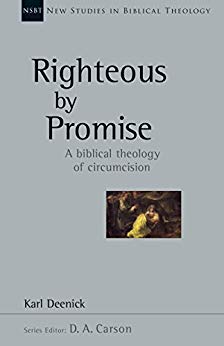A Brief Book Summary from Books at a Glance
By Mark Baker
About the Author
Karl Deenick is Senior Pastor of the Branch Christian Church, Launceston, Tasmania, Australia. He is also a guest lecturer at the Reformed Theological College, Melbourne. His Ph.D. is from Ridley College, Melbourne (back cover).
Overview
You have probably experienced this dilemma before: you want to read a gospel-saturated Bible verse to a group of kids. The problem is that the verse also keeps on mentioning circumcision! You have no idea how you would explain circumcision to the kids, nor do you really know how it fits with the gospel truths of the passage. What do you do? This book seeks to show the rationale behind the Bible’s consistent focus on circumcision. Circumcision is connected to themes such as the promise given to Abraham, righteousness, blamelessness, and faith. It is therefore a vital piece to God’s story of redemption and deserves careful study.
Table of Contents
1 Introduction
2 Circumcision in Genesis: The Sign of the Promise Established
3 Circumcision in the Old Testament: The Meaning of the Sign Developed
4 Circumcision in the New Testament: The Themes of the Old Testament Continued
5 Circumcision in Romans 2–4: Righteousness, Repentance, and Faith
6 Circumcision in Galatians: Righteousness by Faith in the Promised Seed
7 Conclusion: Circumcision, Righteousness, and Faith
Book Summary
Chapter 1: Introduction
A biblical theology of circumcision might seem like a strange topic for a book-length treatment. But a closer look reveals that circumcision “forms the background for some of the most hotly contested writings of the apostle Paul where he defends the gospel against misunderstandings of circumcision… because circumcision was in danger of overshadowing the gospel” (2). Circumcision remains a key theme even in the New Testament because it is often connected to God’s covenant promise of righteousness. This theme has also received renewed attention over the past few decades by scholars such as N. T. Wright and James D. G. Dunn who have presented different conclusions on the relationship between circumcision and faith.
This study begins by raising questions: What is the relationship between righteousness and circumcision? What role does faith have? Furthermore, circumcision is also often paired with the concept of blamelessness. What does it mean when God calls Abraham to “walk before me and be blameless” (Gen 17:1)? Does blamelessness refer to sinless perfection? Or does it merely refer to being transparent or candid before God? Furthermore, the New Testament adds more nuance to both circumcision and blamelessness. This book seeks to address these questions in order to come to a greater understanding of God’s work in the lives of his people.
Chapter 2: Circumcision in Genesis: The Sign of the Promise Established
God’s covenant relationship with Abraham is explained in both Genesis 15 and Genesis 17. What is the relationship between these two chapters? Does God make another covenant with Abraham in Genesis 17, or is he confirming the covenant he already made in Genesis 15? Much attention has been given to this question, but far too little attention has been given to the context of the two chapters themselves.
As stated earlier, the concept of blamelessness is a key related theme. Noah is the first person in the Bible to be described as “blameless” (Gen 6:9). Job is described multiple times as blameless (i.e., Job 1:1), and both Abraham and Israel are commanded to be blameless (Gen 17:1; Deut 18:13). A survey of this word in the Old Testament reveals that the requirement of blamelessness “means more than simply integrity or even faith. It refers to absolute personal holiness, though the lack of that holiness is accounted for in the interim through sacrifice” (22)…
[To continue reading this summary, please see below....]The remainder of this article is premium content. Become a member to continue reading.
Already have an account? Sign In
